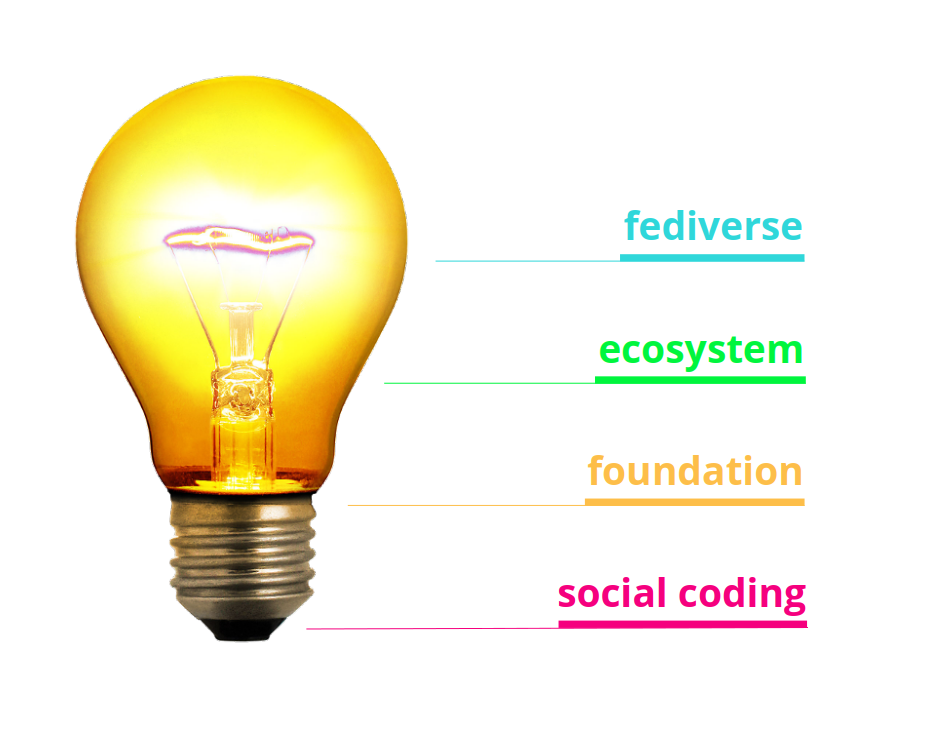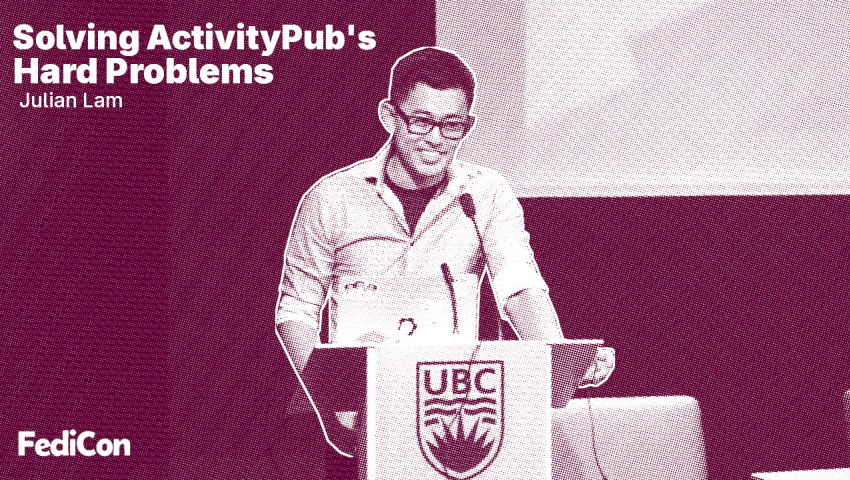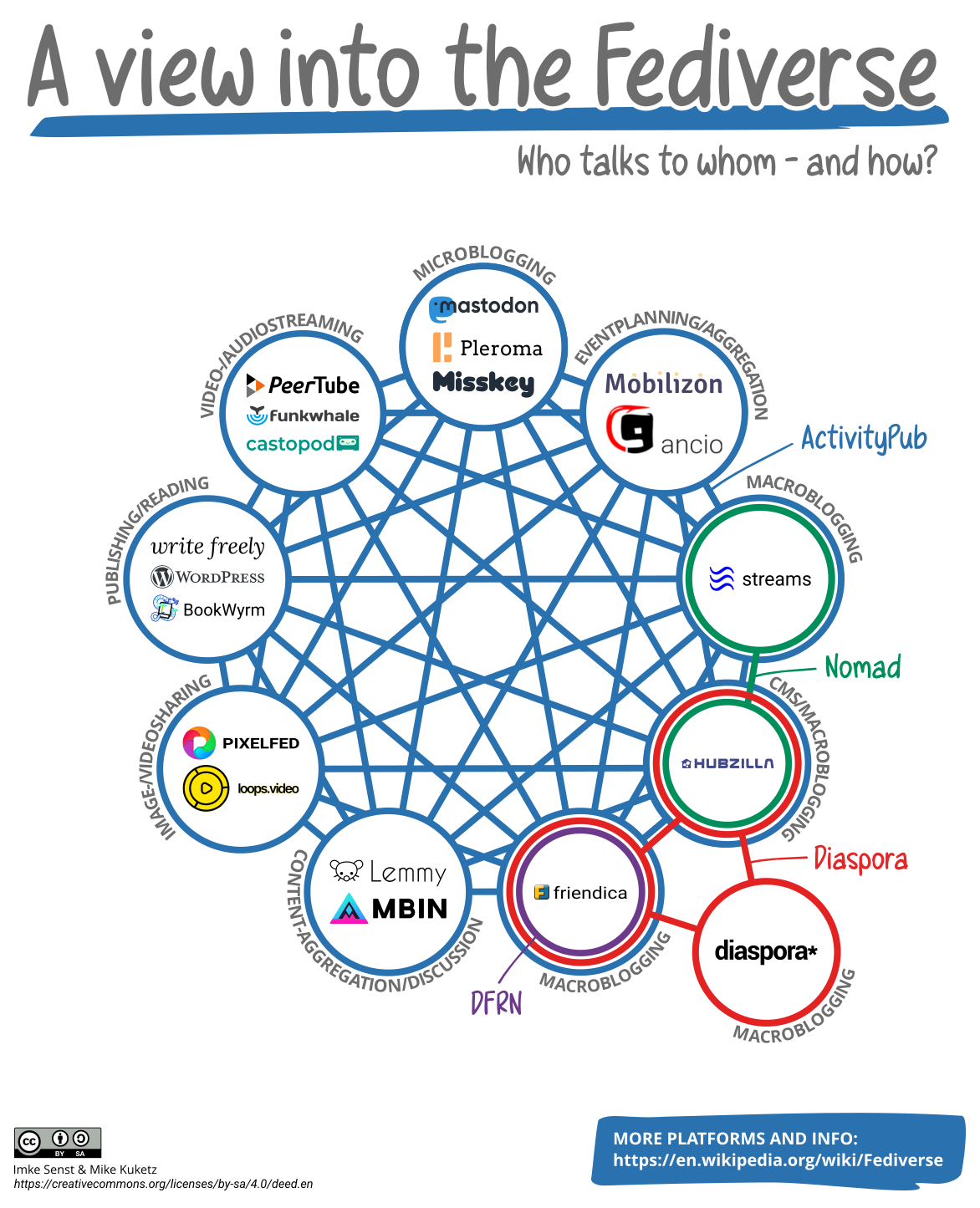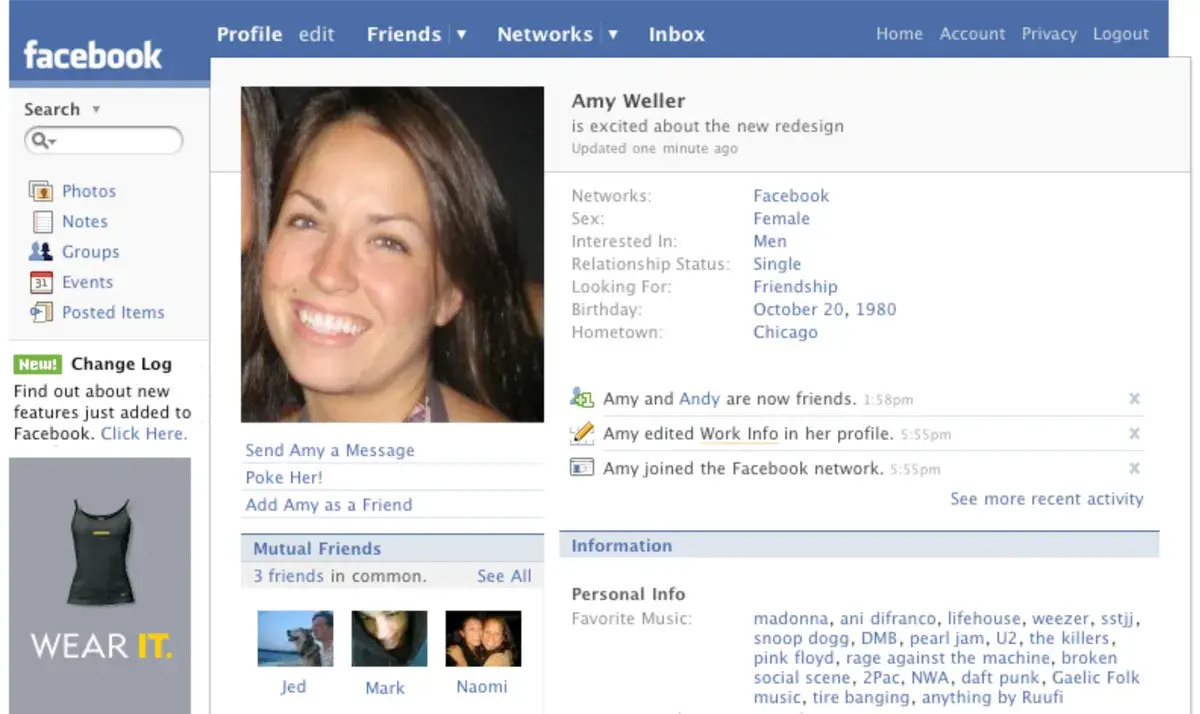FEP drafting: Am I using “side effects” here the same way as other ActivityPub developers? I've seen the term used a bunch in casual conversation, but my personal understanding of it is kinda fuzzy.
Search results
Come migliorare la gestione degli eventi nel fediverso?
André Menrath parla del lavoro che ha fatto: una proposta di miglioria del fediverso FEP-8a8e per permettere a Gancio e ad altri software di comunicare meglio.
Video: https://vimeo.com/showcase/11927245?video=1137648835
FEP: https://codeberg.org/fediverse/fep/src/branch/main/fep/8a8e/fep-8a8e.md
Se conoscete sviluppatori di Gancio fategli leggere la specifica!
![]() @fediverso@feddit.itChe succede nel Fediverso?
@fediverso@feddit.itChe succede nel Fediverso? ![]() @fediverso@diggita.com
@fediverso@diggita.com
#gancio #fep
![]() @bhaugen unfortunately I don’t have a great recommendation. but in two weeks I predict you will see plenty of self congratulation associated with an invite only, off-web, in-person meeting where the closed “open” social web work begins
@bhaugen unfortunately I don’t have a great recommendation. but in two weeks I predict you will see plenty of self congratulation associated with an invite only, off-web, in-person meeting where the closed “open” social web work begins
🙏 Thank you for your attention to this matter.
https://www.w3.org/community/SocialCG
https://socialhub.activitypub.rocks
Has there been any attempts at integrating Fedi stuff with open databases, such as those for movies and games?
Edit:
Found NeoDB!
#fediverse #activitypub #db #databases #movies #games #music
![]() @hrast I've seen this passing by in #fediverse discussions many times, but always in fleety timelines.. aka lost-in-time no further #ideation lines :)
@hrast I've seen this passing by in #fediverse discussions many times, but always in fleety timelines.. aka lost-in-time no further #ideation lines :)
This is a good #idea to describe in more detail in the ideas inbox. Staging ground for the #FEP process and #SocialHub #ActivityPub developer community, if there are people willing to pick them up. And then in turn perhaps staging ground for further standardization by #W3C #SocialCG.
FEP-0151: NodeInfo in Fediverse Software (2025 edition)
I added the "Implementations" section and a reference to FEP-844e:
https://codeberg.org/fediverse/fep/pulls/741
There are 3 independent implementations now. Since this is a "2025 edition", and 2025 is about to end, I think the FEP should be finalized.
If you have any suggestions, please comment here, on SocialHub, or create an issue.
💕 I'm so thankful for all the work to the #FEP process you have 🎁 gifted this entire year. You are one of those who help the #fediverse shine, aggregating building blocks, paving pathways with grassroots #ActivityPub tiles, where only raw substrate of ✨ possibilities existed before.
This "2026 edition" I hope we can walk, all like you, in unison on a singular cause. Towards sunnier #SocialWeb futures. Grow strong to face a gloomy #SocialNetworking landscape of offline society.
FEP-0151: NodeInfo in Fediverse Software (2025 edition)
I added the "Implementations" section and a reference to FEP-844e:
https://codeberg.org/fediverse/fep/pulls/741
There are 3 independent implementations now. Since this is a "2025 edition", and 2025 is about to end, I think the FEP should be finalized.
If you have any suggestions, please comment here, on SocialHub, or create an issue.
Here's another #FEP for representing torrents on activitypub :)
short, sweet, and with a reference implementation and tests!
towards a federated bittorrent tracker with #sciop !
PR: https://codeberg.org/fediverse/fep/pulls/714
Discussion: https://socialhub.activitypub.rocks/t/fep-d8c8-bittorrent-torrent-objects/8309 (or this thread)
#FEP_d8c8 #BitTorrentOverActivityPub #FederatedP2P #BitTorrent
The #FEP website built by ![]() @helge is now online:
@helge is now online:
https://fediverse.codeberg.page/fep/
Enjoy!
RE: https://mymath.rocks/objects/dad3deb4-a29d-4df3-a017-ae5700a387f3
#ActivityPub specs are basis for spec compliance.
Current fediverse is a mixture of flavors. Mastodon is a flavor. The #FEP is a recipe cookbook for particularly flavored meals.
The fedi as it is today will never offer a home to anything that does not in some way represent a timeline with flowing texts, even if masquerading in more creative UI's. Every specialist (not really, just different-than-microblogging) domain auto-excludes itself to live in the fringes of fedi. Just by being different.
Here's a draft FEP to do full account migration with posts and whatever other kinda objects you want to bring with you. It's a trivial expansion of existing ActivityPub/streams systems and supports gradual migration as it's implemented and after an account migration. It should be possible to migrate pretty much everything this way, both private and public objects.
criticism, feedback, revisions, etc. welcome - i don't think this is a "final version" and there are certainly things i overlooked.
https://codeberg.org/sneakers-the-rat/fep/src/branch/move-map/fep/1580/fep-1580.md
https://codeberg.org/fediverse/fep/pulls/692
#MoveAllPosts #FediDev #FEP #FEP_1580 #FullMigration #AccountMigration
I am a fan of starter packs on BlueSky, Threads and Mastodon's iterations on it are all for the better in my book.
My one note: i'm pretty sure from my read of it that this offering and this #FEP will be fediverse-wide and not Mastodon-only. Which makes it even cooler, if so. #fediforum

Mastodon is taking cues from Bluesky with plans for its own starter 'Packs' | TechCrunch
Mastodon is planning to make it easier for newcomers to discover curated collections of users to follow by launching a new starter packs feature.
techcrunch.com · TechCrunch
Link author: ![]() Sarah Perez 💙@Sarahp@mastodon.social
Sarah Perez 💙@Sarahp@mastodon.social
💡 Proposal for ActivityPub: FediStamp
What if any federated platform (Mastodon, WordPress, Pixelfed, PeerTube, WriteFreely...) could offer automatic certification of original content?
When publishing a poem, article, photo or video, you check "Certify original content" and the system gives you:
🔗 A public verifiable link to the registry
📄 A .fedistamp file as permanent proof
✅ A visible badge (Certified content) with clickable link
🧩 Metadata embedded in ActivityPub that travels with each share
Example: I publish a poem on Mastodon, enable the option, and instantly get my ✓ certified proof of authorship.
👉 This doesn't replace copyright (which already protects you), but strengthens it with technical evidence of authorship and date.
⚡ Key points:
Only registers the content hash (no cryptocurrency, just authorship certification).
Free.
Opt-in: you choose what to certify.
Automatic protection for creators across the federated ecosystem, without relying on centralized platforms.
I'm not a programmer, just a writer who sees the need. If someone technical sees merit and feasibility, go ahead.
#ActivityPub #Fediverse #FediStamp #FEP #ActivityPubDev #Mastodon #WordPress #Pixelfed #PeerTube #Creators #OpenSource #DigitalRights #OpenProposal
Any #GoToSocial developers, or anyone else who might know what the hold-up with publishing the FEP for reply controls is, interested in chiming in?
Check out the new ![]() @bonfire Social release candidate. What a wonderful well-designed experience, and superb release notes!
@bonfire Social release candidate. What a wonderful well-designed experience, and superb release notes!
https://bonfirenetworks.org/posts/bonfire-social-1-0rc3/
🎉 Congratulations to the #Bonfire team ![]() @ivan and
@ivan and ![]() @mayel for making it this far, through all that tireless hard work. And also to
@mayel for making it this far, through all that tireless hard work. And also to ![]() @nlnet and
@nlnet and ![]() @ngiNGI Outreach Office for supporting this important project. Future of social networking in the making.
@ngiNGI Outreach Office for supporting this important project. Future of social networking in the making.
To #ActivityPub developers, have a look at those great #fediverse #Interoperability docs:
https://docs.bonfirenetworks.org/federation-interoperability.html
What I loved to see in the #ActivityPub documentation is the inclusion of the list of Fediverse Enhancement Proposals #FEP's that are implemented. It will serve a stimulus for other #fediverse devs to adopt them too, and shape the grassroots standardization process. Posted the list to #SocialHub too..
https://socialhub.activitypub.rocks/t/bonfire-social-1-0rc3-is-released/8071
Also nudging to add #Bonfire as implementation in FEP docs..
https://codeberg.org/fediverse/fep/issues/194
And to review ![]() @helge https://codeberg.org/fediverse/fep/pulls/673
@helge https://codeberg.org/fediverse/fep/pulls/673
https://lists.w3.org/Archives/Public/public-swicg/2025Oct/0001.html
SocialCG people want to make their own FEP repository on GitHub where authors will be required to sign a CLA.
I'd like to make it clear: this is not associated with the original FEP repository. The #FEP process is meant to be open to everyone, and I will do everything I can to stop any attempts to introduce CLAs there.
[View Orginal URL] is a bug in the federation model.
https://spectra.video/w/72dbS6nFMwrgEtRb5h3Sk2
Great talk by ![]() @julian. Thank you!
@julian. Thank you!
"Many of these [Zot/Nomad] ]ideas are being ported to ActivityPub in the form of Fediverse Enhancement Proposals (FEPs).
... Streams ... is working with Mitra to create the first implementation of nomadic identity over ActivityPub. This includes working on several related FEPs about identity proofs and conversation containers.
Our goal is for these technologies to spread throughout the fediverse."
I just realized that the default specifications for ActivityPub/ActivityStreams do not have a way to perform an update on an object's ID. (ie, moving it from example.com/1 -> example.com/2)
An Update activity does not allow ID updates because it would lose the reference to the original one. (It can be massaged by using an Origin property, but I don't like that).
Another option would be to use a Move activity (which is defined as moving objects between collections), where the Origin property is the object itself instead of a collection. (I like this behaviour better, as it requires less divergence from the spec)
Is anyone aware of a FEP for that?
Two upcoming changes in the #FEP process:
- Withdrawing stale proposals. If a proposal remains inactive for 2 years, its status is changed to WITHDRAWN. Previously, the period was 1 year after submission, and facilitators were supposed to contact authors before withdrawing (that didn't work well).
- Implementation tracking. If a proposal has type: implementation attribute, we will automatically count list items in the "Implementations" section and display that number somewhere (probably in README). If your proposal is implementable, I recommend adding type: implementation attribute to it. Also, don't forget to mention implementations if they exist - this information is very important.
That’s Tim. Fantastic article! I’ll have more to say after I re-read this a dozen times, but I want to get out early with an answer to #3: remote actions…
This is why I built fep-3b86 “Activity Intents” which lets people take remote actions from their home server with one click and zero fuss. No JS, no funny protocols required.
Could you please weigh in on this?
![]() @tchambersTim Chambers
@tchambersTim Chambers ![]() @renchapRenaud Chaput
@renchapRenaud Chaput ![]() @dansup
@dansup ![]() @cheeaunChee Aun 🤔
@cheeaunChee Aun 🤔 ![]() @scottjenson
@scottjenson ![]() @newsmastNewsmast Foundation
@newsmastNewsmast Foundation ![]() @andypiper
@andypiper ![]() @ricmacRichard MacManus
@ricmacRichard MacManus ![]() @evanEvan Prodromou
@evanEvan Prodromou ![]() @laurenshof @pfefferle
@laurenshof @pfefferle ![]() @fediversenews
@fediversenews ![]() @timbray
@timbray
![]() @benpateBen Pate 🤘🏻 - can you post a link to that #FEP here? Is this it: https://codeberg.org/fediverse/fep/src/branch/main/fep/3b86/fep-3b86.md
@benpateBen Pate 🤘🏻 - can you post a link to that #FEP here? Is this it: https://codeberg.org/fediverse/fep/src/branch/main/fep/3b86/fep-3b86.md
»#PostQuantumPrivacy for #PostPlatformInternet. — #Fediverse pilots: #ActivityPub with #Dilithiumsignatures. While #Mastodon and other ActivityPub servers still use #RSA-#HTTP-#Signatures by default, developers in the #SocialHub community are working on a #FEP (Fediverse Enhancement Proposal) to clarify signature processing and accommodate #quantumsafealgorithms.« https://hackernoon.com/post-quantum-privacy-for-post-platform-internet?Fedizen.EU #Fedizen #Fediverse #ActivityPub #News
FEP-521a: Representing actor's public keys has been finalized!
https://codeberg.org/fediverse/fep/src/branch/main/fep/521a/fep-521a.md
FEP-844e: Capability discovery has been published to the FEP repository:
https://codeberg.org/fediverse/fep/src/branch/main/fep/844e/fep-844e.md
I already use it to signal RFC-9421 support. An anonymous Application object is added to actors:
{
"generator": {
"type": "Application",
"implements": [
{
"name": "RFC-9421: HTTP Message Signatures",
"href": "https://datatracker.ietf.org/doc/html/rfc9421"
}
]
}
}
All important information is embedded, so additional HTTP requests are not necessary.
The Work Continues: What’s Next
Details will follow soon — but the work on events in the #Fediverse is far from complete. Key upcoming milestones include:
- Improvements and new features for the Event Bridge for ActivityPub plugin for WordPress
Continued development to maintain, fix issues, enhance, and expand functionality. - Work on Fediverse Enhancement Proposals (FEPs)
Ensuring a robust final status of FEP-8a8e and focus on recurring and irregularly scheduled events. - Support for event interoperability in other Fediverse applications
Contribute to other Fediverse applications and help them to explore and improve support forEventobjects. For example, @linos@graz.social has outlined a potential roadmap for Mastodon. - Contribution to GatherPress
Active involvement in the GatherPress project — a modern and truly FLOSS community oriented WordPress event plugin — to ensure full ActivityPub compatibility, including RSVP support and advanced federation features. - Community engagement and outreach
Participation in conferences, public talks, and direct conversations to foster knowledge exchange, gather feedback, and grow the ecosystem around federated events.
Additional updates and technical details will be shared soon. Input, testing, and collaboration from interested parties are always welcome. Or if you know any conferences we should attend, let us know.
#ActivityPub #Events #Fediverse #FEP #GatherPress #WordPress
As we consider ways to implement #ActivityPub into our FOSS Community Calendar Ecosystem platform Koalagator, I've been looking over the differing specs for how to specify the event object schema.
Have any other folk wrestled with this?Asking before I get arms deep in this stuff.
For those playing at home...
---
Schema.org - Event
Schema.org is a collaborative, community activity with a mission to create, maintain, and promote schemas for structured data on the Internet.
-----
W3C Activity Vocabulary - Event
This specification describes the Activity vocabulary. It is intended to be used in the context of the ActivityStreams 2.0 format and provides a foundational vocabulary for activity structures, and specific activity types.
https://www.w3.org/TR/activitystreams-vocabulary/#dfn-event
----
Fediverse Enhancement Proposal
FEP-8a8e: A common approach to using the Event object type
ActivityStreams defines the Object Type Event. In real-world applications, the event object immediately showed the need for extension. Applications featuring Event objects have often chosen to add additional attributes and clarifications (i.e., interpretations) in order to implement their particular use case. This proposal clarifies and extends the ActivityPub standard to address the needs that have arisen in real-world implementations.
https://codeberg.org/linos/fep/src/branch/fep-8a8e/fep/8a8e/fep-8a8e.md
---
[HTML] Microformats - h-event
People are using microformats to mark up profiles, posts, events and other data on their personal sites, enabling developers to build applications which use this data in useful and interesting ways.
https://microformats.org/wiki/h-event
---
iCalendar Standard (RFC 5545)
iCalendar was first defined as a standard as RFC 2445 in 1998 by the Internet Engineering Task Force (IETF). Today, iCalendar is used to import and synchronize events on various platforms, including smart phones, computer and web applications.
https://icalendar.org/the-icalendar-standard-2.html
#EventObjectSchema
#Calendar #Standards #WebStandards #W3C #Microformats #FEP #FediverseEnhancementProposals #iCal #iCalendar #FOSS #WebDevelopment #WebDesign #RubyOnRails #Rails #Mastodon #Dev #Developer #OpenStandards
I wrote a #FEP about actor statuses. Yeah, those things near the name that Facebook had in 2007.
https://codeberg.org/fediverse/fep/src/branch/main/fep/82f6/fep-82f6.md
Started writing a new FEP:
FEP-0151: NodeInfo in Fediverse Software (2025 edition)
Mentioned some best practices. What else should be added there?
After reviewing FEP-5624: Per-object reply control policies and GoToSocial's interaction policy spec, I find myself leaning toward the latter for long-term considerations, though both have merit.
FEP-5624 is admirably focused and simpler to implement, which I appreciate. However, #GoToSocial's approach seems to offer some architectural advantages:
- The three-tier permission model (allow/require approval/deny) feels more flexible than binary allow/deny
- Separating approval objects from interactions appears more secure against forgery
- The explicit handling of edge cases (mentioned users, post authors) provides clearer semantics
- The extensible framework allows for handling diverse interaction types, not just replies
I wonder if creating an #FEP that extracts GoToSocial's interaction policy design into a standalone standard might be worthwhile. It could potentially serve as a more comprehensive foundation for access control in #ActivityPub.
This is merely my initial impression though. I'd be curious to hear other developers' perspectives on these approaches.
#FEP5624 #fedidev #fediverse #replycontrol #interactionpolicy
Like Christine, I think the future of the fediverse will look quite different to the current Mastodon-dominated network, and more like the user experience offered by BS;
https://dustycloud.org/blog/how-decentralized-is-bluesky/
The raw materials already exist to build this evolution of the verse. The question is, how do we pull it all together?
(6/6)
Coda: The growth of BlueSky, and the novel features it launches with, point to a need for a 2.0 version of ActivityPub. One that fleshes out and updates the protocol based on dev experiences in the first decade of active use, and intentions going forward.
Ideally an AP 2.0 would include a formal mechanism for protocol extensions. One that learns from the experiences of the FEP process.
Progress on the FEP for Event objects
The FEP-8a8e (Fediverse Enhancement Proposal) had at lot of progress in the last months. In the meantime, the document has become somewhat more extensive than originally planned, but contains not only instructions for new features that have to be tediously implemented, but also a lot of advice and points that should provide orientation for developers of Fediverse applications that support events.
It now covers:
- Required attributes
- Events with Open End
- Timezone
- Physical and Virtual Locations
- Event status
- RSVP (Attendee Management)
- Event Banner and Poster Images
- Event Categories
- Discoverability
- Event Organizers
- Upcoming Events Collection for ActivityPub actors
- Term Definitions
Many thanks again to all reviewers and co-editors:
![]() @lesionles
@lesionles ![]() @heiglandreasAlerta! Alerta! @naturzukunft
@heiglandreasAlerta! Alerta! @naturzukunft ![]() @laurin
@laurin
We warmly welcome further feedback from the communities of #Friendica, #Mobilizon, #Hubzilla, and other Fediverse platforms supporting events.
If you’re working on such an application or are part of these communities, your insights would be very valuable! @developers ![]() @mobilizon
@mobilizon
How to subscribe to a thread?
Several days ago FEP-efda: Followable objects was published. I don't like this solution because ActivityPub spec only talks about "following" in the context of actors, and the proposed "proxy-following" mechanism forces us to change some well-established practices.
So here is an alternative: FEP-f06f: Object observers.
Object observer is an actor that can be followed to receive object updates. If conversation thread is a collection, its observer will broadcast Add and Remove activities that have thread collection as their target. Observer's followers will have an up-to-date view of the thread.
I've made some changes to FEP-521a: https://codeberg.org/fediverse/fep/pulls/482
- Many changes due to a rename of Controller Documents specification to Controlled Identifiers.
- Using https://www.w3.org/ns/cid/v1 context in example. I haven't tried it myself yet, but it works in JSON-LD playground.
- Key ID and actor ID are now recommended to have same origin.







